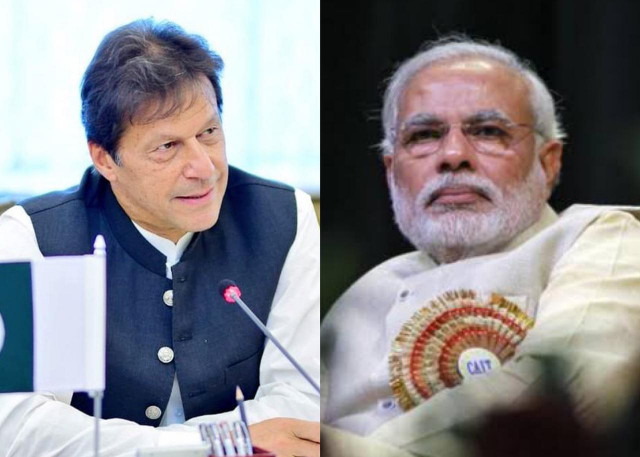Changing the dynamics of Pakistan-India relations
Undoubtedly, the past history of Pakistan-India relations is a major impediment to building mutual trust.

File photos of PM Imran Khan [L] and Indian Premier Narendra Modi [R]. PHOTO: PIT/ Reuters
Prime Minister Imran Khan congratulated his Indian counterpart through a tweet that was reciprocated and was followed up by a phone call. The questions on every one’s mind: Will Modi, who has won with a heavy mandate, be more accommodating and a less divisive PM than he was in his first term? Is his policy toward Pakistan going to be any different or about the same? Will PM Imran Khan’s repeated gestures of goodwill carry weightage and what are the major factors that would determine India’s attitude toward Pakistan?
A major plank of PM Modi’s election canvassing was based on targeting Pakistan and wooing the extremist Hindu groups. In terms of performance, unemployment in India has risen steeply, the farmers are complaining that their incomes have fallen and industrial production has taken a fall. To sidetrack these major failings, Modi focused on security, Hindu nationalism and Pakistan bashing.
For Pakistan’s leadership the great challenge is how to relate to the politically powerful and rejuvenated Modi. After all, he is the same PM who had recently boasted of having ordered an aerial attack on Pakistan. It is a different matter that it was an embarrassing failure of the Indian military, but for the general public, perception is more important than reality. Despite the unpleasant past, the path pursued by PM Imran Khan to engage in right earnestness is correct and has the support of major political parties and the military.
The pertinent question is what are the determining factors on the basis of which our future relationship would rest? Modi being voted back to power by an increased majority reaffirmed the apprehension that the character of Indian politics and social structure has undergone a radical transformation. To put it bluntly, India is now a full-fledged unapologetic Hindu state with no pretentions of being secular. In this is woven a strong element of Indian and Hindu nationalism merging as the dominant component of Indian politics. And these policies are in conflict with the secular democracy that India in the past professed and took pride in. It would be interesting to see how social and political scientist and historians would view this development. A simplistic analysis would probably express the inevitability of this phenomenon once India was partitioned on the basis of a religious divide.
What are likely to be its implications for the minorities of India especially the Muslims that are already the most oppressed class is to be seen. And linked with this is how the Babri mosque court verdict would play out. Another much larger question is if this victory would embolden Modi to fulfil his election manifesto of revoking the Article 370 of the Indian Constitution and thereby changing the character of Kashmir. For this, the BJP will need a two-thirds majority in Rajia Sabha and a four-year wait. With the Valley already in full revolt, any such move would only exacerbate the situation posing greater hardship for beleaguered Kashmiris, a new challenge for the Muslims of India and the Pakistan-India relations.
The gross violations of human rights in Kashmir remain a serious impediment to developing mutual confidence between the two countries. This clearly will remain a restraining factor unless Modi seriously revisits his Kashmir policy.
India’s hostile attitude towards CPEC also weighs against lifting pressure on Pakistan. This too will have to change.
Pakistan has also tried to ensure that the UN-banned organisations are kept in strict check. This measure would not only restore the confidence of the international community but also strengthen democratic norms within the country while providing no grounds to India for pushing Pakistan on the defensive with its attendant drawbacks. Action against militant groups is an essential prerequisite of the Financial Action Task Force (FATF) for Pakistan’s removal from the grey list. Effective action against these entities did facilitate the recently hard-bargained IMF staff agreement as well. Pakistan’s security establishment is fully aware of that and is taking appropriate measures to ensure maximum compliance.
The United States would support improvement in Pakistan-India relations provided Pakistan’s military would persuade the Taliban leadership to come to an honourable settlement with the US on Afghanistan. China has always encouraged Pakistan to engage with India and recalibrate the support of anti-India militant groups to gain its confidence and that of the international community.
Undoubtedly, the past history of Pakistan-India relations is a major impediment to building mutual trust. But this is what leadership is all about, to face the challenge and make genuine efforts at changing the course and dynamics of these relations for the larger good of its people. Furthermore, if India seriously aspires to play a major regional and global role it has to relate to Pakistan more positively and show greater consideration toward the other south Asian countries. Pakistan too has its obligations as a responsible member of South Asia that it is expected to faithfully comply with.
Published in The Express Tribune, May 29th, 2019.
Like Opinion & Editorial on Facebook, follow @ETOpEd on Twitter to receive all updates on all our daily pieces.















COMMENTS
Comments are moderated and generally will be posted if they are on-topic and not abusive.
For more information, please see our Comments FAQ